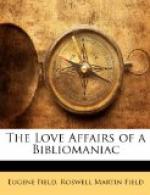I felt harshly toward Captivity Waite for a time, but I harbor her no ill-will now; on the contrary, I recall with very tender feelings the distant time when our sympathies were the same and when we journeyed the pathway of early youth in a companionship sanctified by the innocence and the loyalty and the truth of childhood. Indeed, I am not sure that that early friendship did not make a lasting impression upon my life; I have thought of Captivity Waite a great many times, and I have not unfrequently wondered what might have been but for that book of fairy tales which my Uncle Cephas sent me.
She was a very pretty child, and she lost none of her comeliness and none of her sweetness of character as she approached maturity. I was impressed with this upon my return from college. She, too, had pursued those studies deemed necessary to the acquirement of a good education; she had taken a four years’ course at South Holyoke and had finished at Mrs. Willard’s seminary at Troy. ``You will now,’’ said her father, and he voiced the New England sentiment regarding young womanhood; ``you will now return to the quiet of your home and under the direction of your mother study the performance of those weightier duties which qualify your sex for a realization of the solemn responsibilities of human life.’’
Three or four years ago a fine-looking young fellow walked in upon me with a letter of introduction from his mother. He was Captivity Waite’s son! Captivity is a widow now, and she is still living in her native State, within twenty miles of the spot where she was born. Colonel Parker, her husband, left her a good property when he died, and she is famous for her charities. She has founded a village library, and she has written me on several occasions for advice upon proposed purchases of books.
I don’t mind telling you that I had a good deal of malicious pleasure in sending her not long ago a reminder of old times in these words: ``My valued friend,’’ I wrote, ``I see by the catalogue recently published that your village library contains, among other volumes representing the modern school of fiction, eleven copies of `Trilby’ and six copies of `The Heavenly Twins.’ I also note an absence of certain works whose influence upon my earlier life was such that I make bold to send copies of the same to your care in the hope that you will kindly present them to the library with my most cordial compliments. These are a copy each of the `New England Primer’ and Grimm’s `Household Stories.’ ‘’
At the age of twenty-three, having been graduated from college and having read the poems of Villon, the confessions of Rousseau, and Boswell’s life of Johnson, I was convinced that I had comprehended the sum of human wisdom and knew all there was worth knowing. If at the present time—for I am seventy-two—I knew as much as I thought I knew at twenty-three I should undoubtedly be a prodigy of learning and wisdom.




